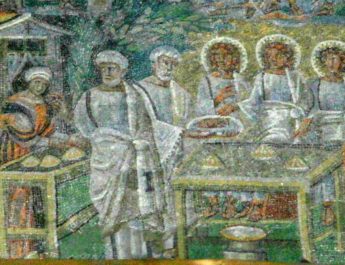Philippians 4:4-7
Advent C3
4 RejoiceA in the LordB always;C again I will say, Rejoice.
A “rejoice” = chairo. From char– (to extend favor, lean towards, be inclined to be favorable towards). This is to rejoice, be glad or cheerful; a greeting. This is the root verb that the Greek word for “grace” comes from (charis).
B “Lord” = Kurios. From kuros (authority, supremacy). This is a respectful address meaning master or sir. It refers to one who has control or power greater than one’s own. So, it was also applied to God and Jesus as Master or Lord.
C “always” = pantote. From pas (all, every, each) + tote (then, whether past or future); {from hote (when); from ho (the)}. This is literally every when. It is always, at all times.
5 Let your gentlenessD be knownE to everyone.F The Lord is near.G
D “gentleness” = epieikes. 5x in NT. From epi (on, upon, against, what is fitting) + eoika (to be like); {related to eiko (be like, resemble); perhaps akin to eiko (to be weak, submit, yield, give way)}. This is yielding, gentle, reasonable, moderate, patient, equitable, forbearing.
E “be known” = ginosko. This is to know, recognize, realize, perceive, learn. It is knowledge gained through personal experience.
F “everyone” = pas + anthropos. Pas is related to “always” in v4. See note C above. Anthropos is probably from aner (man, male, husband) + ops (eye, face); {from optanomai (to appear, be seen); perhaps from horao (become, seem, appear)}. This is human, humankind. Used for all genders.
G “near” = eggus. This is nearby or near in time.
6 Do not worryH about anything, but in everythingI by prayerJ and supplicationK
H “worry” = merimnao. 19x in NT. From merimna (care, worry, anxiety; being separated from the whole); from merizo (to divide, part, share, distribute, assign; figuratively, to differ); from meros (part, share, portion figurative or literal); from meiromai (to get your share, receive one’s allotment). This is to be anxious, distracted, or care for. It is being pulled in different directions – usually a negative.
I “everything” = pas. Same as “everyone” in v5. See note F above.
J “prayer” = proseuche. From proseuchomai (to pray or pray for, to worship or supplicate; more literally exchanging one’s own wishes for God’s); {from pros (advantageous for, at, toward) + euchomai (to wish, make a request, pray)}. This is prayer, worship, or a place where one prays.
K “supplication” = deesis. 18x in NT. From deomai (having an urgent need because one is missing or needing something so it is an earnest appeal or pressing request); from deo (to tie, bind, fasten, impel, compel; to declare something against the law or prohibited). This is a request coming from a deep personal need or want. So, it is supplication or prayer.
with thanksgivingL let your requestsM be made knownN to God.O
L “thanksgiving” = eucharistia. Related to “rejoice” in v4. 15x in NT. From eucharistos (thankful, well favored); {from eu (good, well, well done, rightly) + charis (grace, kindness, favor, gratitude, thanks; being inclined to or favorable towards – leaning towards someone to share some good or benefit; literal, figurative, or spiritual; grace as abstract concept, manner, or action); {from chairo (see note A above)}. This is thankfulness or thanksgiving. It is active gratitude. It is related to the word “eucharist.”
M “requests” = aitema. 3x in NT. From aiteo (to ask, demand, beg, desire). This is literally something asked or the act of asking. So, it is a request or demand. It can also be a petition.
N “made known” = gnorizo. Related to “be known” in v5. From ginosko (see note E above). This is to declare, know, discover, make known.
O “God” = Theos. From Proto-Indo-European origins, meaning do, put, place. This is God or a god in general.
7 And the peaceP of God, which surpassesQ allR understanding,S
P “peace” = eirene. Perhaps from eiro (to join, tie together to form a whole). This is one, peace, quietness, rest, peace of mind, harmony. Peace was a common farewell among Jews (i.e. shalom) and this well-wishing included a blessing of health and wholeness for the individual. This word also indicates wholeness and well-being – when everything that is essential is joined together properly. This is peace literally or figuratively. By implication, it is prosperity (but not in the sense of excessive wealth. Prosperity would have meant having enough from day to day).
Q “surpasses” = huperecho. 5x in NT. From huper (by, under, over, above, under the authority of another) + echo (to have, hold, possess). This is to hold above, surpass, governing, high quality or value. It is to have beyond, excel.
R “all” = pas. Same as “everyone” in v5. See note F above.
S “understanding” = nous. Related to “be known” in v5 & “made known” in v6. From noos (mind) OR from the same as ginosko (see note E above). This is mind, understanding, reasoning faculty, intellect, capacity to reflect. It can refer to God’s mind or human minds – thoughts, feelings, will, or reflective thinking.
will guardT your heartsU and your mindsV in ChristW Jesus.X
T “guard” = phroureo. Related to “everyone” in v5. 4x in NT. From phrouros (a guard) OR from pro (before, in front of, earlier than) + horao (see note F above). This is to guard, keep, or protect. It is to guard or keep watch as by a military sentinel. Figuratively, it is using active defensive or offensive tactics to guard.
U “hearts” = kardia. Literally the heart, but figuratively mind, character, inner self, will, intention, thoughts, feelings. Also, the center of something. The word heart is only used figuratively in the Old and New Testaments. This is where “cardiac” comes from.
V “minds” = noema. Related to “be known” in v5 & “made known” in v6 & “understanding” in v7. 6x in NT. From noeo (to think, understand, conceive, realize, see; one who thinks things through sufficiently to reach a conclusion or value judgment; moral reasoning.); {from nous (see note S above)}. This is thought, scheme, feeling, heart, purpose, understanding, perception, intellect. It is what the mind produces – the result of thinking.
W “Christ” = Christos. From chrio (consecrate by anointing with oil; often done for prophets, priests, or kings). Literally, the anointed one, Christ. The Greek word for Messiah.
X “Jesus” = Iesous. From Hebrew Yehoshua (Joshua, the Lord is salvation); {from YHVH (proper name of the God of Israel; the self-existent and eternal one); {from havah (to become) or from hayah (to come to pass, become, be)} + yasha (to deliver, defend, help, preserve, rescue; properly, to be open, wide or free, which implies being safe. So, in a causative sense, this is to free someone)}. This is Jesus or Joshua in Greek – the Lord saves or the Lord is salvation.
Image credit: “The Lyrics of Spring” by Lisa Sabater-Mozo, 2012.




